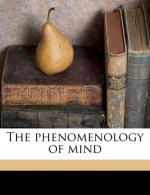
|
| Name: _________________________ | Period: ___________________ |
This test consists of 15 multiple choice questions and 5 short answer questions.
Multiple Choice Questions
1. How does Hegel describe observation?
(a) As a reliable process.
(b) A contingent on subjectivity.
(c) As a mobile army of metaphors.
(d) As necessarily flawed.
2. What is the result of force in Hegel's philosophy?
(a) A reassessment of relationships.
(b) A new authority.
(c) A new law.
(d) A new understanding.
3. What is it that expresses both the individual and inner reality, in Hegel's view?
(a) Physical form.
(b) Conflict within the self.
(c) Self-reflection.
(d) Action.
4. In what way could Hegel see a person, a table and a fruit as all identical?
(a) They are all raw material for consciousness.
(b) They are all 'mind'.
(c) They are all 'objects of perception' to another person.
(d) They are all 'things'.
5. According to Hegel's philosophy, independent self-consciousness is both an aspect of concrete individuality and what else?
(a) Scientific consciousness.
(b) Self-reflection as the process of expressing the self.
(c) Spirituality.
(d) Thinghood insofar as the self is an object of knowledge.
6. To what does the term "sensibility" apply according to Hegel?
(a) Humans and animals.
(b) The entire universe.
(c) All humans.
(d) All living things.
7. What relation binds the object and the perceiver in Hegel's philosophy?
(a) History.
(b) The World-Spirit.
(c) Understanding.
(d) Reason.
8. According tio Hegel where do psychological laws originate?
(a) In the concrete reality of the self.
(b) In the failure of the power of observation.
(c) In the fulfillment of self-consciousness.
(d) In self-reflection.
9. What does Hegel explain in the introduction of The Phenomenology of Mind?
(a) Why the work is necessary to his times and to humanity.
(b) Where the inspiration for the work came from.
(c) Why he was the only one who could have written this work.
(d) Where the work fits in the history of philosophy.
10. What do both parts of a lordship/bondage relationship seek in Hegel's philosophy?
(a) The elimination of the other.
(b) Equilibrium.
(c) Dominance.
(d) Self-certainty of consciousness.
11. What is a pre-condition to Reason according to Hegel?
(a) Stable self-certainty.
(b) Stable sources of food and shelter.
(c) Double consciousness.
(d) Transcendent self-awareness.
12. Hegel writes that the divisive power of the mind allows the self to define itself relative to what?
(a) The family.
(b) The individual's past.
(c) The self.
(d) The external universe.
13. According to Hegel, what is "honest activity" related to?
(a) The origins of action.
(b) The effects of action.
(c) Emptiness.
(d) Seeming.
14. What human trait does Hegel say is not found in animals?
(a) Organic consciousness.
(b) Self-reflection.
(c) Organic behavior.
(d) Life being lived for itself.
15. How does Hegel describe the set of things that work against the "law of the heart"?
(a) Liberating.
(b) Oppressive.
(c) Perfecting.
(d) Refining.
Short Answer Questions
1. According to Hegel, action turns the external world into an arena where what can come into being?
2. According to Hegel, how does the truth of concrete individuals manifest?
3. What is the relationship between phrenology, physiognomy, and cranioscopy according to Hegel?
4. What causes the formation of laws according to Hegel?
5. In Hegel's philosophy, what does the self want instead of the good and the true?
|
This section contains 566 words (approx. 2 pages at 300 words per page) |

|




